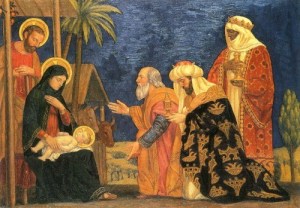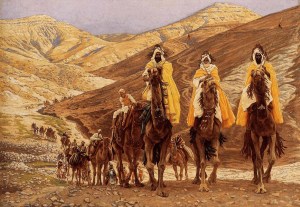Today is the twelfth day of Christmas, “Epiphany,” which celebrates the arrival of the Magi. Jesus coming to save us didn’t all happen in one day – Epiphany reminds us our Christmas spirit should likewise influence more than just one day a year. We should continue to celebrate the things God has done yearlong, especially the gift of Christ and salvation. In the spirit of Epiphany and the continued celebration of Jesus, we figured we’d share some research on the enigmatic Magi!

How Many Were There?
We all know “We Three Kings” and every Nativity set has three. Would you be surprised if the Bible doesn’t actually say a number? Their were just three gifts. (I promise! Read Matthew 2:1-12!) Three is a fair guess, but if you want to spice up your Epiphany, try these on for size:
- 4th century catacomb frescoes at Rome show 2
- 3rd century catacomb frescoes at St. Domitilla show 4
- One ancient vase shows 8
- Medieval Eastern lists have 12 – and include names!
- Early Christian writer John Chrysostom claimed 14 in his commentary
All we know for sure is, there was more than one. “Magi” is plural, so Matthew would have said “magus” (singular) if only one showed up!

What Did They Do For a Living?
Reading Matthew’s account thoroughly, you’ll notice “We Three Kings” doesn’t only make assumptions about their number. The Bible doesn’t actually call them “kings” either! Tertullian (about AD 210) felt the need to clarify this tradition: “The Orient, for the most part, held the Magi for kings.” To add spice to your Epiphany though, we dug up options other than “king”:
- Priest: Herodotus calls Magi a “priestly caste” six centuries before Jesus
- Magician: We get “magic” from “magi” and we see such performers in Scripture.
- Acts 8:9-24 tells of Simon the Magus of Samaria (“sorcerer” in some translations)
- Acts 13:6 tells of a Jewish Magus of Cyprus that Barnabas and Paul meet
- Both of these men seemed able to work some sort of magical or spiritual signs
- Politician: Josephus writes of another Magus in Cyprus who worked in Governor Felix’s court (AD 50s).
- Astrologer: Matthew’s Magi followed a star – one that told them 1. it’s a king, 2. he’s being born, and 3. in Judea. Pretty specific for your run-of-the-mill star. So you can add astrology to their job skills. They gazed at stars to mystically learn from them.
Whether you celebrate them as astrologers, astronomers, magicians, miracle workers, priests or kings, you can be sure of this: they were people high in the penthouse and they took interest in Jesus’ birth. The coming of our savior was for all, the low and the high!
![]()
Where Did They Come From?
Afar. (The song told me so.) The obvious answer is, “from the East” – as in, somewhere east of Judea. One 6th century mosaic shows Magi in Persian dress, and we know historically Magi existed in Persia, Parthia, India and other regions.

The most likely of these (if you want my opinion) is Arabia. Gold was mined in Arabia, and both frankincense and myrrh came from trees that grew there. Justin Martyr writing in AD 160 writes five times that they were from Arabia, something he never feels the need to defend, as if it wasn’t debatable because it was commonly known. Tertullian and Clement of Rome also agreed on Arabia.
Any Other Interesting Details?
- Epiphany means “manifestation”
- Matthew calls Jesus “child” instead of infant, the Magi arrive at a “house” and not the traditional nativity scene, and Herod kills baby boys under two years old – so the Magi probably didn’t show up the night Jesus was born, but rather up to two years later!
- The “star” didn’t lead them to Bethlehem. It indicated Judea, so they logically went to the capital, Jerusalem. It was here they were pointed to Bethlehem due to a prophecy (Micah 5:2)
- Star prophecies were the latest rage. Numbers 24:17 has one, and by Jesus’ day this Old Testament passage was considered “Messianic” – predicting the savior. Josephus applied it to Vespasian; early Christians like Origen applied it to Jesus.
- For many, gold represents Jesus’ royalty, frankincense his divinity, and myrrh his mortality, as it was a common funeral spice.
If you simply must know names – some Christian traditions name them Melchior, Caspar, and Balthazar.

Want more? Read Adam’s article on letting Epiphany celebrate Christ’s coming beyond December 25th! ( Epiphany: Christmas Ain’t Over ‘Til It’s Over )
For Further Reading:
“The Jesus I Never Knew” by Philip Yancey
“The Star of Bethlehem: The Legacy of the Magi” by astronomer Michael Molnar


Yes we need to worship Him daily and not just His coming but His living a sinless life and dying a cruel death so that we might live.
LikeLiked by 2 people
Amen to that!
LikeLiked by 1 person